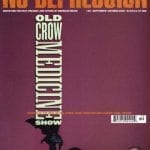John Brannen – Too cool for preschool
Music features don’t usually germinate like this: My initial contact with John Brannen comes not in a club or via a publicist, but at a local preschool where, it turns out, both his daughter and my son are enrolled. Despite my critic’s radar pegging him as different from the other parents — with his rakish good looks, black jeans and boots, Brannen exudes “rock ‘n’ roller” — our first few casual conversations consist wholly of dad talk.
Even when we finally do get around to some serious music discussion one day, we still can’t resist comparing notes on our kids. What, I wonder, does young Claire Marie think of Brannen’s new CD?
“Oh, she calls it ‘Daddy music,'” he says. “Next to Veggie Tales, my records are her favorite music to listen to. I’m number two on her charts!”
The tunes on Twilight Tattoo (released June 27 on Sly Dog Records) boast the kind of depth and nuance that only comes with experience. From rockers such as the Steve Earle-meets-Georgia Satellites opener “Just Restless” and the randy, swaggering “Black Mountain Dandy” through introspective fare such as “A Cut So Deep” (a slice of roots-soul, featuring Lucinda Williams) and the title track (a meditation on Iraq’s human toll as seen through the eyes of a soldier), Twilight Tattoo surpasses the high standard Brannen set with his 2004 release The Good Thief.
Cut in Nashville with David Z (Prince, Etta James, Kenny Wayne Shepherd), Twilight Tattoo came together quickly thanks to the producer’s “catch it fast, early and live” approach. As Brannen puts it, “I think the bloom is off the rose when you have to go back and chop a song up too much and interfere with the way it was performed.”
Co-writing several songs with guitarists Kevin Bowe and Duane Jarvis also accelerated the process for Brannen. (On The Good Thief, he collaborated with Eagles associate Jack Tempchin.) “I’m more productive if I’m co-writing,” he explains, “and as my friend Willis Alan Ramsey says, he didn’t want to spend the rest of his life in a room by himself being clever!”
The duet with Williams was done later in Los Angeles; Brannen’s immensely proud of how the song turned out. “There really was a vocal compatibility,” he says. “There are even some places where we kind of flipped the harmonies around and you have to listen closely to tell which one of us is high or low. She’s such a magic presence.”
Raised in Charleston, South Carolina, Brannen inked a deal in 1988 with Capitol Records imprint Apache, which released his Springsteen-esque debut Mystery Street; its single “Desolation Angel” landed Brannen on MTV. By his self-titled 1993 disc, he was being groomed for country stardom by Mercury Nashville and touring with Toby Keith and Shania Twain. A video for “Moonlight And Magnolias” found a slicked-up Brannen resplendent in outrageously ornate duds — “a cross between Gram Parsons and Liberace,” he laughs.
“I’d happened to be in Manuel’s store,” he says, referring to Manuel Martinez, Nashville’s “couture cowboy” tailor. “I didn’t even have the record deal yet. Manuel looked at me and said, ‘I have something for you. Wait right here.’ He comes back in and he’s got this coat that looks like something the archangel Michael wore! I put it on and everybody just sort of stepped back in awe. I looked at the price tag, then said, ‘Listen, I don’t even have a deal!’ He said, ‘Oh no, you will — take it! I believe in you!’ And in about two weeks I did!”
Unlike the coat, however, the homogenized demands of Music Row proved an ill fit for Brannen. Feeling the tug of coastal roots, he returned home to Charleston in 1996 and released an album titled Scarecrow in Europe in 2000. The Good Thief followed in 2004 on Detroit label Sly Dog.
Not long after that, Brannen moved to the North Carolina mountains. A touch of awe comes into his voice as he talks about his adopted home. “I love walking up through the Blue Ridge,” he says. “There’s this feeling of being here that you can rise up above the mist and take a look at where you’ve been.”
Brannen instinctively draws upon his surroundings for inspiration (check the Twilight Tattoo track “The Mountain”), although much of his material is draped in the primary emotions: love, lust, sin, regret, redemption. “Hopefully, when you’re going through these emotional releases of writing a song, you’re describing something that’s traveled through you, and you’ve also come upon something that’s universal,” he says.
Brannen leans forward to emphasize the point he’s making. “A song has to reverberate with authentic experience for me. When that happens, you can hear it, feel it. It’s that unspoken language that we’re all trying to achieve, in any walk of life, I think.”




